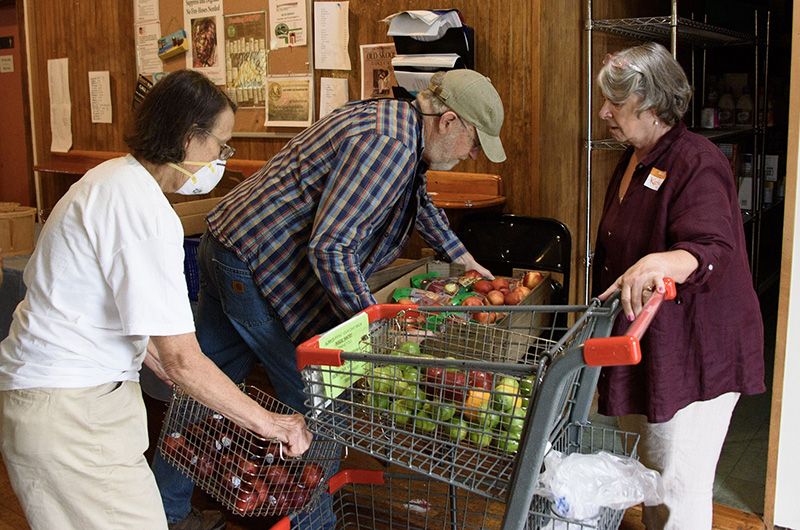For many seasonal travelers, Martha’s Vineyard, with its multi-million-dollar homes, picturesque shopping districts and pristine beaches appears the epitome of an affluent Island.
But a previously hidden scourge is gaining visibility: growing food insecurity made more dire by record inflation and a worldwide pandemic.
At the peak of summer, that’s meant 620 residents per week visiting the Island Food Pantry — a 52 per cent increase from this point in 2021, according to pantry officials.
“Everybody thinks this is an Island of the rich and famous, but there is a whole group of year-round people who are dependent on the seasonal economy,” said Rebecca Haag, Island Grown Initiative director. “Most of those people live on nine months’ pay and have to stretch it to 12 months. These are working families who can barely make it here.”
The juxtaposition is striking: In a place where the median price of a home is now more than $1.3 million, Dukes County’s per capita income is below the statewide average at just $43,994, according to U.S. Census Bureau data for 2020.
“Incomes here are not great, and as soon as you get off that ferry, everything costs 20 per cent more” on Island, Ms. Haag said.
While many urban areas serve large populations of chronically poor residents, Ms. Haag described the anatomy on-Island food insecurity as “folks who are episodically in need. These are working people who still can’t feed their children from time to time.”
According to Island Food Pantry Equity Director Merrick Carreiro, one in three children attending Island public schools qualifies for free and reduced-price lunches. Add to that a growing Island population of residents oldar than 65, who are increasingly homebound and dependent on fixed incomes.
That translates to nearly 3,000 residents registered at the Island Food Pantry – twice as many people, Ms. Haag says, as before the beginning of the pandemic. Over the course of the year, that translates to an average of 1,259 pantry customers a month.
The pantry, which currently leases space at the Portuguese American Club in Oak Bluffs, is open to the public three days a week, with a fourth morning available solely to seniors.
Allotted one visit per week, customers are accompanied by a volunteer through the neatly organized aisles as they fill their shopping baskets from a selection of prepared foods, frozen meat, grains, legumes and dairy, as well as personal hygiene items, baby formula and even pet food.
Some items — such as formula — have limits due to high demand and low supply.
The pantry, which merged with the IGI in 2017, is run by Sharon Brown. A longtime chef who moved to Martha’s Vineyard in 2018, Ms. Brown says she turned to supplemental meals to help feed her teenage son when COVID brought the restaurant industry to a grinding halt in 2020.
With an additional background in food services and social services, Brown has tied other aspects of community support to the pantry site, including a visiting nurse and substance and alcohol abuse counselors.
“We try not just to focus on food, but on the larger picture,” Ms. Brown said.
The pantry is just one portion of the IGI’s growing web of services, which include its longstanding school garden and gleaning programs, a Mobile Market, food waste collection from local restaurants, and a network of borrowed commercial kitchens where Island chefs turn gleaned produce, meats and seafood into frozen ready-made soups, stews and baby formulas.
Area farms, including Morning Glory, Grey Barn, and Slough Farm go “above and beyond” with donations of produce, bread and proteins, Ms. Carreiro said. The pantry also is given a weekly allotment from the Greater Boston Food Bank, though quantity has decreased due to inflation in recent months, from 10,000 pounds of food per week to roughly 7,000.
During the school year, IGI prepares meals from the Camp Jabberwocky campus in Vineyard Haven. In the summer, the operation moves to Martha’s Vineyard Regional High School.
This summer, Ms. Carreiro said, the IGI is preparing 400 lunches a day, five days a week for summer students, projecting to deliver 12,000 meals over six weeks. Extras go to area seniors. A Community Supper Series runs each Wednesday through Aug. 10 at the Martha’s Vineyard Regional High School from 5 to 6 p.m.
An Education and Innovation Center and employee housing project is in the works, but Island Grown is sorely in need of its own year-round commercial kitchen and expanded storage space, as the pantry’s lease at the P.A. Club runs out in early 2023, with an option to renew through 2024.
Carreiro, a former owner of Little House Cafe, said she was originally brought on board at IGI in October 2021 to help envision a new Island Food Center, what she describes as “what we were hoping to be the next home for the pantry, the processing kitchen, more storage, hopefully education. We were picturing a huge [cohesive space].”
However, Ms. Carreiro said, the frenzied, record-shattering real estate market on the Vineyard dashed those hopes.
“The availability of the real estate to build on, the cost of building now makes it very difficult,” she said. “We have another priority to try to secure a year-round kitchen for our food processing program,” she said.
Right now, the IGI has storage space for no more than a week’s worth of groceries, but the organization’s goal is to have two to three weeks’ worth of food stored on its shelves and freezers.
“We see need only continuing to increase, particularly in the off-season,” Ms. Brown said.
To donate to the Island Food Pantry and Island Grown Initiative, visit igimv.org.











Comments (6)
Comments
Comment policy »